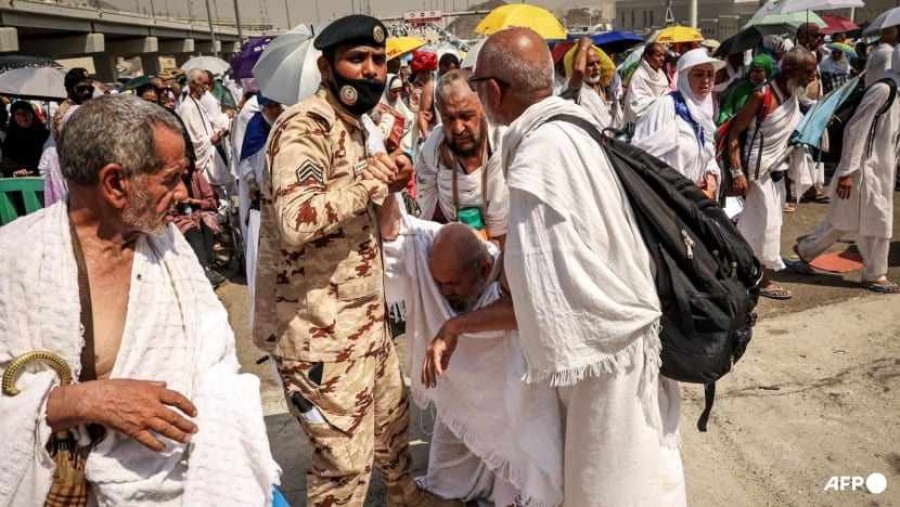Saudi Arabia says deaths during Haj pilgrimage reach 1,301, as officials defend management decisions
24 June, 2024

The number of deaths during this year's Haj pilgrimage totalled 1,301 people, Saudi Arabia's health minister Fahad Al-Jalajel said on Sunday (Jun 23).
During the 2023 Haj pilgrimage in Saudi Arabia, 1,301 deaths occurred due to extreme heat and lack of shelter, with 83% of fatalities among unauthorized pilgrims. Over 1.8 million pilgrims participated, facing challenges accessing essential services amidst scorching temperatures exceeding 50 degrees Celsius in Mecca.
The minister, quoted by state television, said that deaths were caused by pilgrims "walking long distances under direct sunlight without adequate shelter or comfort".
Fatalities also included a number of elderly people and those suffering from chronic diseases. Some 83 per cent of the fatalities were among people who were not authorised to make the pilgrimage, he said.
On Friday, a senior Saudi official defended the Gulf kingdom's management of the Haj pilgrimage.
"The state did not fail, but there was a misjudgement on the part of people who did not appreciate the risks," the official told AFP in the government's first comments on the deaths.
An AFP tally on Friday, compiling official statements and reports from diplomats involved in the response, put the toll at 1,126, more than half of them from Egypt. The senior Saudi official said the Saudi government had confirmed 577 deaths for the two busiest days of Haj: Saturday, when pilgrims gathered for hours of prayers in the blazing sun on Mount Arafat, and Sunday, when they participated in the "stoning of the devil" ritual in Mina.
"This happened amid difficult weather conditions and a very harsh temperature," the official said while acknowledging that the 577 figure was partial and did not cover all of Haj, which formally ended on Wednesday.
"Regrettably, the number of mortalities reached 1,301, with 83 per cent being unauthorised to perform hajj and having walked long distances under direct sunlight, without adequate shelter or comfort," the official Saudi Press Agency reported.
The Haj is one of the five pillars of Islam, and all Muslims with the means must complete it at least once before they die.
Saudi officials had earlier said 1.8 million pilgrims took part this year, a similar total to last year, and that 1.6 million came from abroad.
For the past several years the mainly outdoor rituals have fallen during the sweltering Saudi summer.
The timing of the Haj moves forward about 11 days each year in the Gregorian calendar, meaning that next year it will take place earlier in June, potentially in cooler conditions.
A 2019 study by the journal Geophysical Research Letters said because of climate change, heat stress for hajj pilgrims will exceed the "extreme danger threshold" from 2047 to 2052 and 2079 to 2086, "with increasing frequency and intensity as the century progresses".
PERMIT-LESS PILGRIMS
Haj permits are allocated to countries on a quota system and distributed to individuals via a lottery.
Even for those who can obtain them, the steep costs spur many pilgrims to attempt the Haj without a permit, though they risk arrest and deportation if caught by Saudi security forces.
The irregular route, which can save pilgrims thousands of dollars, has become increasingly popular since 2019 when Saudi Arabia introduced a general tourism visa, making it easier to enter the Gulf kingdom.
Before this year's Haj, Saudi officials said they had cleared more than 300,000 would-be pilgrims from Mecca who did not have Haj permits.
But later, the senior Saudi official said on Friday, "an order came from above that we allow people who arrived at the gates of the holy places" to participate.
"We can estimate the number of the unregistered pilgrims at around 400,000," the official said.
"Almost all of them from one nationality," the official added, an apparent reference to Egypt.
But later, the senior Saudi official said on Friday, "an order came from above that we allow people who arrived at the gates of the holy places" to participate.
"We can estimate the number of the unregistered pilgrims at around 400,000," the official said.
"Almost all of them from one nationality," the official added, an apparent reference to Egypt.
SCORCHING TEMPERATURES
The Haj, whose timing is determined by the Islamic lunar calendar, fell again this year during the scorching Saudi summer.
Temperatures reached 51.8 degrees Celsius at the Grand Mosque in Mecca on Monday, according to the National Meteorological Centre.
Unregistered pilgrims did not have access to amenities meant to make the pilgrimage more bearable, including air-conditioned tents.
Unregistered Egyptian pilgrims told AFP this week that in some cases they struggled to access hospitals or hail ambulances for loved ones, some of whom ended up dying.
The pilgrims also said they could not access official Haj buses - the only transportation around the holy sites - without paying exorbitant, off-the-books fees.
Forced to walk for many kilometres under the blazing sun, some reported seeing motionless bodies on the roadside and pilgrims collapsing because of apparent exhaustion.
The senior Saudi official told AFP on Friday that there was no blanket ban on unregistered pilgrims using the buses.
"There is no ban on them using the buses but these buses are prepared for the registered pilgrims that we know are coming," the official said.
The unregistered pilgrims "walk along bus routes that are not set up with food or medical services like ambulances. It's a highway for the buses".
Source: www.channelnewsasia.com
TAG(s):
